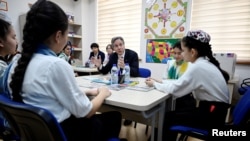U.S. Secretary of State Antony Blinken said he discussed Uzbekistan’s reform agenda with President Shavkat Mirziyoyev during a closed-door meeting Wednesday in Tashkent.
After Uzbekistan, Blinken heads to India for a G-20 foreign ministers’ meeting. The chief U.S. diplomat said he has no plan to meet separately on the sidelines with Russian Foreign Minister Sergey Lavrov or Chinese Foreign Minister Qin Gang, who also are attending the meeting.
Speaking to reporters in Tashkent, Blinken said he highlighted the importance of media freedoms and having a space for civil society.
He pointed to efforts to rid Uzbekistan’s cotton industry of forced labor, noting that was both a great achievement and an example to others.
“We applauded the [reform] steps that had been taken. I noted as well the importance not only of having a strong vision but of fully implementing it. And of course, that remains an important work in progress,” said Blinken during a press conference when asked if he advised Mirziyoyev against trying to change the constitution to extend his terms.
President Mirziyoyev is planning a constitutional referendum this year that would enable him to run again after two terms.
A genuine choice of political alternatives was not available to voters because true opposition candidates were unable to register or run for office, according to the State Department’s human rights reports.
Also on Wednesday, Blinken said it was important to thoroughly investigate allegations of human rights violations by Uzbek law enforcement during unrest in July.
Twenty-one people were killed in conflict over plans to curtail the autonomy of the Uzbekistan’s Karakalpakstan region.
Following the violence, Mirziyoyev quickly rescinded the proposed amendments to the constitution, which currently describe Karakalpakstan as a sovereign republic with the right to secede via referendum, a special status defended by thousands of citizens.
Blinken was in Uzbekistan a day after meeting with his counterparts from five Central Asian countries, an effort he said Wednesday was about cooperating to deepen regional integration.
He said they also discussed the dangers posed by Russia’s invasion of Ukraine, which he said “fostered deep concern across the region.”
“After all, if a powerful country is willing to try to erase the borders of the sovereign neighbor by force, what’s to stop it from doing the same to others,” Blinken said, according to the Associated Press.
The U.S. secretary of state next heads to New Delhi to meet with Indian government officials and the foreign ministers meeting of G20 nations.
Russian sanctions
Blinken said Tuesday during a stop in Kazakhstan that the United States is paying attention to how sanctions enacted in response to Russia’s invasion of Ukraine are affected other countries in the region.
“We are watching compliance with sanctions very closely, and we're having an ongoing discussion with a number of countries, including our C5 partners, on the economic spillover effects,” Blinken said during a news conference after meeting with officials of the five Central Asian states.
Blinken added that temporary waivers have been granted to companies or entities in countries that are engaged with sanctioned Russian companies so that they have time to wind down those activities and cut their ties with Russia.
On Tuesday, Blinken also announced additional aid to Kazakhstan.
“We also stood up the economic resilience initiative for Central Asia — $25 million to expand regional trade routes, establish new export markets, attract and leverage greater private sector investment, providing people with practical skills for the modern job market. Today, I'm announcing an additional $25 million to that initiative, a total of $50 million to build up the regional economy,” he said at a joint press conference with Kazakh Foreign Minister Mukhtar Tileuberdi.
Kazakhstan has a population of 19 million people, of whom 3.5 million are ethnic Russians and 250,000 are ethnic Ukrainians.
“The level of concern is very high and has been from the beginning,” said a Central Asian senior official, referring to Russia’s war on Ukraine.
Kazakhstan has provided humanitarian aid to Ukraine. Kazakh President Kassym-Jomart Tokayev is the only one among Central Asia leaders who keeps in touch with Ukrainian President Volodymyr Zelenskyy, according to the official.
Meanwhile, Kazakhstan maintains good relations with both Russia and China.
“Kazakhstan will continue its multilateral foreign policy. It means that we are trying to keep the system of checks and balances to develop the mutually beneficial cooperation relationship with all the countries of the world," Tileuberdi said during the news conference on Tuesday.
Blinken renewed the U.S. warning for China not to provide lethal weapons to Russia for its use in the war against Ukraine. He said the United States has "information" that China is considering moving beyond the nonlethal support that some of its companies have been providing to lethal material support for Russia.
“We will not hesitate” to target Chinese companies or individuals that violate our sanctions or otherwise engage in supporting the Russian war effort in Ukraine, Blinken added.







